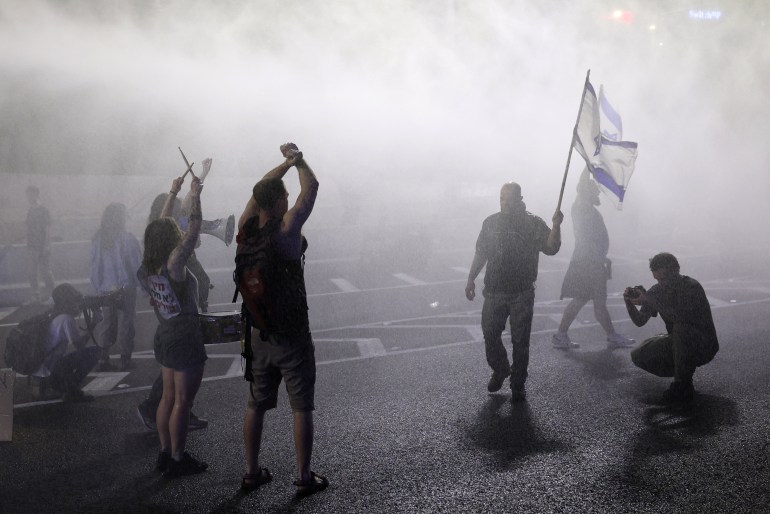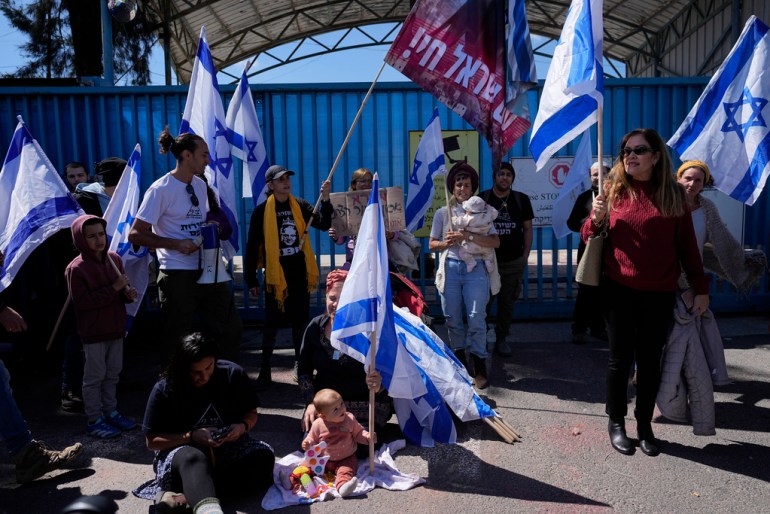As Israel’s war on Gaza drags on, criticism appears to be focused on embattled Israeli leader Benjamin Netanyahu, a man indicted on multiple corruption charges, while thousands of protesters took to the streets to demand his resignation.
However, discontent over Netanyahu and the far-right provocateurs in his government should not be confused with a weakening of public support for the war being waged to punish Gaza for a Hamas-led attack on October 7 and supposedly secure the release of Gaza reach the remaining prisoners brought from Israel that day, analysts say.
I think that Israeli society is currently somewhere between fascism and Nazism, and no one seems to have noticed.
Observers say that while Netanyahu’s critics question him as an individual, his war goals still enjoy the support of a society that is becoming increasingly right-wing and ultra-religious and believes Palestinians are somehow “less” than them.
“We have people walking around with automatic weapons, and just saying you’re afraid of a Palestinian gives you legal justification to shoot them,” says Haim Bresheeth, author of “Introducing the Holocaust: A Graphic Guide.” and Professor of Film Studies at SOAS, said from London.
Political development
“I think Israeli society is currently somewhere between fascism and Nazism, and no one seems to have noticed,” said Bresheeth, who left Israel in the 1970s and whose parents were both killed in Auschwitz.
A poll conducted by Israel Hayom in January found that an overwhelming majority of respondents (81.5 percent) supported the idea that the war in Gaza remains the best means of securing the release of prisoners.
Furthermore, a survey by the Israel Democracy Institute (IDI) showed a clear reluctance among Israelis to increase aid deliveries to Gaza ahead of the recent International Court of Justice ruling that ordered Israel to allow more aid to Gaza to avert famine.
“Two trends have been going on for about 20 years,” said Mairav Zonszein, a senior analyst at the Tel Aviv-based International Crisis Group.
“Israeli society, especially the young generation, has become much more right-wing, the polls show that… We have seen that support for ultra-Orthodox and far-right politics has increased and has eventually reached not only the government but also the courts. “the army and the education system,” she said.
The current Israeli cabinet, which includes the far-right Itamar Ben-Gvir, convicted in 2007 of inciting and supporting terrorism, and Bezalel Smotrich, who leads the hardline Religious Zionist Party, has a mandate that could hold it until 2026.
“People complain about the presence of the extreme right and ultra-Orthodox in power, especially the liberals. However, it is important that we do not conflate these objections, which often relate to their own political freedoms, with concern for the lives of Palestinians,” Zonszein continued.
Isolated?
International criticism of Israel’s attack on Gaza has done little to undermine domestic assumptions created by decades of political and media narratives about the country’s “regional isolation.”
After complaining about being victims of the United Nations for years and accusing the United Nations’ main humanitarian agency in Gaza of being infiltrated by the Palestinian group Hamas, Israeli ministers rejected the Security Council’s call for a resolution in late March Truce quickly ended.
Other international criticisms – such as the report by UN special rapporteur Francesca Albanese, which found that Israel was involved in three of the five acts of genocide mentioned in the 1948 convention – were also dismissed as anti-Semitic by Israel’s political and media establishment than its allies in the UNITED STATES.
Few would dispute that Netanyahu has not encouraged or benefited from the growth of the ultra-religious and far-right, but the claim that suffering in Gaza would be less without him is ridiculous, Zonszein said.
Before the October attack, Israel was confident in its position as an untouchable regional superpower and confident that leading Arab states were willing to ignore expanding settlements and normalize relations, she continued.

October 7 turned these assumptions on their head and dealt a blow to the Israeli self-confidence under which the state was still cringing.
“October 7 touched all of Israeli society, from the soldiers who documented their war crimes on TikTok to the politicians who instructed them.
“Israeli society has been conditioned for years to see the Palestinians as the enemy,” Zonszein continued. “It is convenient to blame Netanyahu, nothing more. Others would take a similar approach. When it comes to Gaza, Netanyahu represents the consensus.”
The army
More than 33,000 people have died in Gaza and nearly 76,000 others have been injured in Israeli attacks.
Within the enclave, reports of torture of civilians and UN staff are widespread, while allegations that the Israeli army has killed starving people in search of food are commonplace.
“Since around 2000, the Israeli army has been taken over by the far right,” Bresheeth argues in his book “An Army Like No Other,” that the army both forged and reflected Israel’s cultural and political identity.
“Right-wing recruits entered the army from the lower ranks before being gradually promoted. By about 2008, maybe 2009, they had essentially become the army,” he said.
“Don’t get me wrong, this wasn’t exactly a liberal organization before, it’s always been an extremely nationalist organization.
“After all, this is the same army that oversaw the Nakba [the expulsion of some 750,000 Palestinians from their homeland in 1948]and the wars that followed. However, this is something new.”

Before the current war against Gaza, the reach of the ultra-nationalists and religious groups had reached its limits, said Israeli analyst Nimrod Kolbenberg about the nationalist fervor that Israel discovered in the conflict.
“The extreme right has been expanding its influence on the state for many years. “Since the war, the Israeli public has politically rejected Netanyahu’s path, but also fully accepted the politics of the right – namely the war of annihilation being waged in Gaza,” he told Al Jazeera from Berlin, where he lives.
What might happen next in the war is the subject of intense speculation.
As leading politicians in the West, not least US President Joe Biden, increasingly direct their criticism at Netanyahu, it is clear that his leadership is more about effect than cause.
